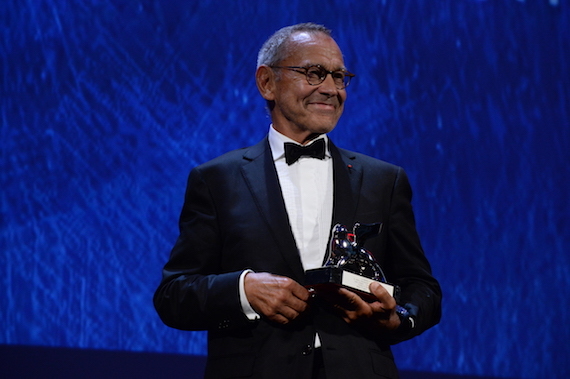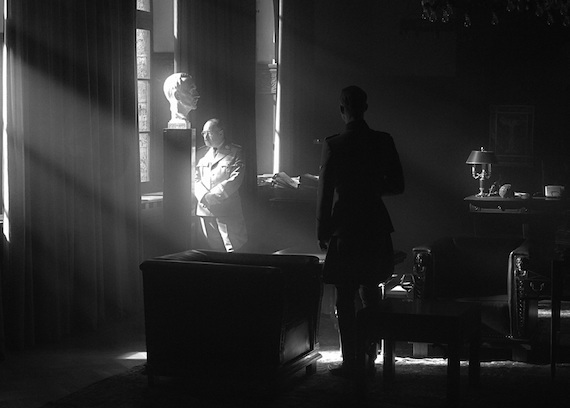Is Paradise always a great place, for all?
We use the word "paradise" loosely in our everyday lives, to describe an idyllic place where we spent our summer vacation, or the word's more common counterpart "heaven" to talk about a feeling of bliss after a great meal or an intense yoga class. But can the concept of paradise be used to create a hell on earth for some?
It can, and it was.
During Nazi times, this precise idea of a German paradise, was used to justify the murder of millions of Jews who, according to Hitler's criminal standards, had caused the decadence of Germany. My own family's destiny at that point in time changed dramatically and we became refugees. Now, once again and less than a century later, we are seeing so much of this kind of racist hysteria. Both in the US and throughout the world, our only hope at the moment lies in really rediscovering what paradise justified back them, so that we will never forget and most importantly, never repeat this kind of tragedy again.
At this year's Venice Film Festival, Andrei Konchalovsky premiered his latest oeuvre Paradise, a story that follows three distinct characters whose lives intersect and intertwine during WWII. As I sat inside the press screening of Paradise, I realized almost immediately that Konchalovsky would win a prize in Venice, because although his film takes place more than 70 years ago, it's revolutionarily prophetic.
Thanks to a grandiose group of people who made the magic happen, and you know who you are, I got to interview the Maestro. Konchalovsky in person is a rockstar, sporting a cool hat, cooler glasses and wearing a pair of fantastic, handmade two-tone leather shoes that had an antique pink front and green back. I'm telling you, it was the perfect look for a perfect man.
On my way out the door from our interview, I turned around to tell him how I felt about his look, and to my "you are a rockstar Maestro!" Konchalovsky answered with an enthusiastic, "you made my day!" Which of course proves my theory completely. It's like the concept of cool, which the moment you think of it to describe yourself, could never ever be. True cool is someone like Konchalovsky.
Andrei Konchalovsky was awarded the Silver Lion for Best Director for Paradise, at the 73rd Venice International Film Festival.
I read in your director's statement, that you wanted to make a film that reminds us where we've been so we don't make that same mistakes again. Particularly now, your film explains a lot, but also lets us see, through your German character Helmut in particular, that therein lies a human being even beneath all this inhumanity. How did you come to write this film, and why now?
Andrei Konchalovsky: Now because I wanted to... I don't think about messages, or some kind of actuality -- it's a tale. I tend to have a philosophical take on human beings and I start to think -- and it's very soothing if you think that the whole humanity and every individual separately is someone's experiment on life. It's an experiment of some higher forces or logic, or space or whatever. I was thinking to make a film about three characters that all somehow intermingle in different dimensions of human existence.
They come from such different backgrounds.
Konchalovsky: But all these three characters, I like them. It's very important to like characters, because it's easy to show a Nazi who is an animal, or a sadist or a terrible person, or something. You immediately sense, he's bad. Evil is a much more sophisticated thing.
That's why it's so successful...
Konchalovsky: Exactly! Because if all dressed as evil openly, who would go and follow them? Basically, people usually follow someone who gives them a great illusion of something good. And that's important for me to understand. I like all these three characters and I like their collaboration and I like this Nazi officer, and it's exactly because I like them that I'm suffering.
Very often in life you like a person, and if you love a person, and a person does terrible things, you don't stop loving them for that. You just suffer. I think audiences shouldn't be given pre-digested truths. The audience should come into the seduction of the character. It's like a big novel, in it you can have wonderful characters that are totally wrong.
Although you didn't write this film about a bigger message, I think you are being prophetic by looking to the past. Do you think that filmmakers like yourself are the prophets of our time?
Konchalovsky: It's a big compliment, thank you. I like to hear it from you, but I cannot be guided by this idea. I think that what's important for me is being an artisan. I don't want to be considered as a genius or a prophet, I'd like to be considered as a master who is looking for new ways of understanding the world.
In a sense, my previous film was the beginning of my new chapter in filmmaking after fifty years. The more intensely you look at something, the more universal it becomes. It's kind of a very intent listening and seeing things. When you are in silence and you really intend to listen to silence, you start to hear extraordinary things. Inside yourself and in that sense, I feel that the less you see, the more you understand because I'd like to invite you to imagine what I want you to imagine. I want you to be co-author. That's why literature is a much more sophisticated art than cinema.
Is that why you made Paradise in black and white as well? Because that simplifies our viewing, we are forced into this tale, with all our senses?
Konchalovsky: I think the Holocaust and concentration camps in color is obscene. It's not true. It is not what we know. We are horrified by images which cannot be seen in 3D, in wide shot, in color, it cannot be that, because it was fixed as a very simple camera. It was just horrifying as a fact. I was trying to make certain facts and put them together.
Do you believe that cinema is a far reaching medium -- unlike literature which you yourself pointed out is more sophisticated -- people will always go to the movies? And that said, do you feel a responsibility to tell stories that may help us to understand each other better?
Konchalovsky: Sure, it's easier to watch than to read. That's where mass market went, to pictures. Cinema became a kind of entertainment, by feeding people with a lot of exciting images. The difference between entertainment and art is that entertainment excites you and you forget about it the moment you go out of the cinema. Art should be entertaining, but you don't forget it when you come out of the theater and that's the difference. For me, that's the most important part of my understanding, that people walk out and for some time, they don't want to speak.
I sat next to a lovely woman at the screening and we'd become friends you know by sitting next to each other. But when your film ended, I didn't even turn around to say goodbye. I could not.
Konchalovsky: That's the biggest compliment.
You have lived and worked both in your home country of Russia and in the US. What do you feel are the advantages of both places, and their problems?
Konchalovsky: You know, I started as a Soviet filmmaker, and Soviet filmmaking was a wonderful period when you knew exactly what you shouldn't talk about in order to have money and to make a film. It was in a sense, quite easy. We worked with Tarkovsky and made Andrei Rublev. It would have been very difficult to make in the West because it was expensive and in that sense we were not free but we made certain successful films. Then Tarkovsky went to Europe and I went to the US and I was looking for freedom. And looking for freedom I found that you can talk about anything as long as you have a return of money. So you can do everything but you have to make a profit. If you can make a profit you can make whatever you want. That becomes a problem because not everything can give you a profit and it becomes a different kind of despair and dependence.
So you are not really free in the West either!
Konchalovsky: Of course not. And then I returned back because ideologically it was completely free but there was no money, in the early '90s in Russia. So freedom, no money. And when you think that you're free, it's also an illusion. Because freedom never creates any masterpiece. Don Quixote by Cervantes was created under tremendous censorship of the Inquisition.
But what man, what artists cannot be free from, ever, and unfortunately I see that they try to free themselves even from that, is moral values. Because moral values is a censorship and you cannot be free from that.
But a censorship you impose on yourself?
Konchalovsky: You cannot be, without gravitational forces. Because as you know, a human being without gravity starts to decline, physically. He needs gravitation. The same thing with morals. The moral ethics and the great tradition of morals -- because I am Russian, Christian, European -- I understand I can never be completely free from it. I know what is good, what is bad... It's very interesting for me to understand that I'm not free now, but it's inner.
If you have an audience member who comes into Paradise and he or she are only able to take away one message from your film, what would you want that to be?
Konchalovsky: A big question. No answers. As a matter of fact there are no answers. Only questions. We try to answer and we always will fail.
Images courtesy of La Biennale, used with permission.


